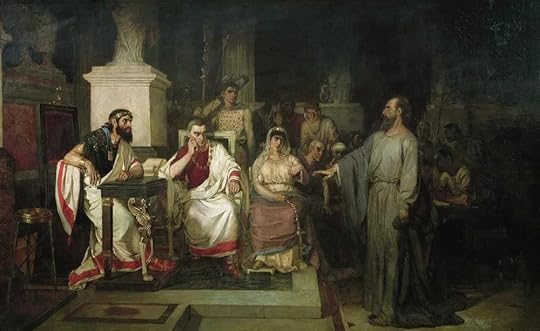When Paul Spoke Truth to Power

Vasily Surikov, The Apostle Paul Explains the Tenets of His Faith in the Presence of King Agrippa, his Sister Veronica, and Proconsul Festus, 1875.
As I’ve been gathering stories and case studies for my next book, I’ve been watching and learning from movements around the world that are facing religious and political opposition. The book of Acts comes alive when you read it through the eyes of these persecuted saints.
They rebuke our preoccupation with politics and power. They remind us of the core missionary task.
In Acts 24–25, the Jewish leadership wants Paul dead and they want the Romans to do the deed.
Paul is facing two charges. (1) Defiling the temple, a crime that the Romans agreed deserved death. (2) Threatening the peace of the empire by following a man who was crucified for claiming to be the king of the Jews.
Paul counters by saying he came to Jerusalem to worship, not to foment rebellion. He asserts he is a faithful Jew who acknowledges Jesus as Israel’s Messiah, and that the movement known as the Way is not a breakaway sect but the fulfillment of Judaism.
Paul is in the right; the charges are false. There is no evidence for a conviction, but if successive Roman governors set Paul free, they fear a Jewish uprising. The deadlock is broken when Paul, a Roman citizen, refuses to go to Jerusalem for a trial and instead appeals to the emperor in Rome.
It’s out of the governor’s hands now, but how will he advise the emperor on why he is sending a prisoner to the emperor who appears to be innocent.
Paul stands before an impressive audience, in chains — a Jewish king, a Roman governor, the military commanders, and the leading men of the city of Caesarea, the Roman military headquarters.
Through Paul’s weakness, God is revealing where real power resides. The risen Lord is fulfilling his promise that Paul would be his witness before kings and governors.
This is the climax of Paul’s defense speeches in Acts. He speaks, not just for himself, but for the movement he represents. Paul is sandwiched between the Jewish elite who want him dead, and the Roman authorities who find him innocent but fear the trouble his release would cause. Yet Paul doesn’t consider himself a victim. Instead, he uses these hearings to bear witness to his Lord.
As a faithful Jew, Paul recounts how he persecuted followers of Jesus, and how, on the way to Damascus, he discovered that Jesus of Nazareth was the risen Lord who shares God’s glory. This Jesus commissioned Paul to serve in his mission.
This is how the risen Lord described Paul’s mission and ours:
To open the eyes of both Jews and Gentiles so they could see the reality of Jesus, the crucified and victorious Messiah, Savior, and Lord.
To turn them from darkness to light. People are captive to Satan, but they can be liberated by embracing the truth about Jesus and turning to God in repentance.
To tell them that they may receive forgiveness of sins and a place among God’s people, made holy by faith in Jesus.
Paul’s mission was not to overturn the Jewish law and temple, or to challenge Roman rule. Instead, he was called to turn the Gentiles to a new way of life.
He wants everyone listening—the Roman governor, the Jewish king, the military commanders, and the leading men of Caesarea—to become like him (apart from his chains!) and put their faith in Jesus.
Once again, Paul turns legal defense into gospel proclamation. He obeys Jesus’ commission, at the risk of prison and death. He wants Jews like Agrippa and Gentiles like Festus to be included among the people of God.
Paul was confident that his life and ministry were in God’s hands, and so before these powerful rulers he could freely proclaim the good news and call them to faith in Christ. Paul might have lobbied for all kinds of political causes or he might have demanded protection for the Christian community, but instead he offers salvation in Christ to these representatives of an oppressive empire. Paul trusted in the promise of Jesus, who said that when his disciples stand before rulers, he would give them the words and the wisdom they needed.
Festus and Agrippa reject the call to repent, but by now, two Roman governors and a Jewish king have all agreed that Paul has done nothing under Roman law to deserve death or prison.
There’s no record of what Paul said to the emperor Nero when he stood before him in Rome. I think Luke is saying that Paul would have said something similar to what he said to two Roman governors and a Jewish king. He defended himself against the charges and then preached the gospel. That’s what it means to speak truth to power.
Politics is not ultimate; God is. Our mission is the spread of God’s Word, resulting in disciples and churches to the glory of God. Everywhere.
Adapted from Acts and the Movement of God.




